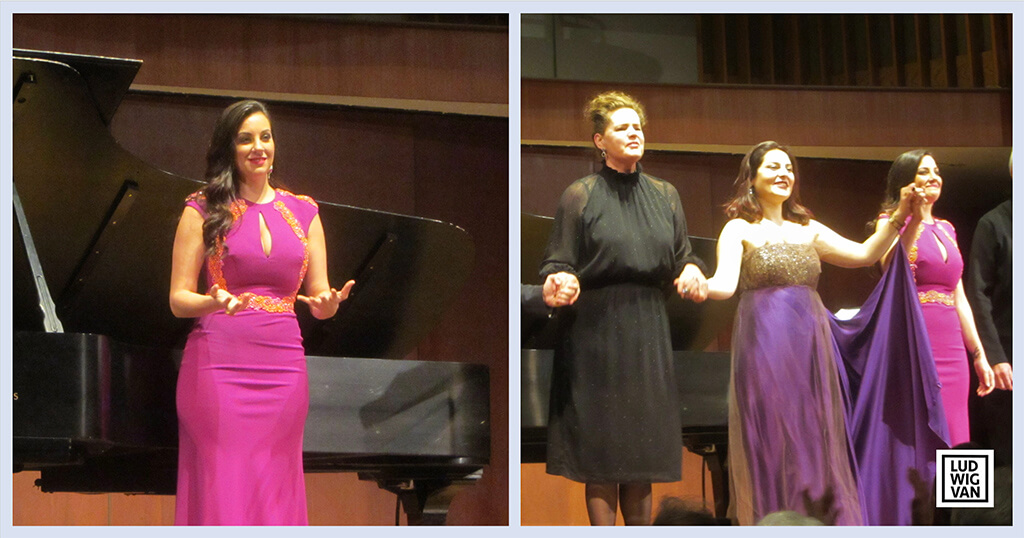
L’invitation au voyage: songs by Duparc, Ravel, Faure, Bizet, Roussel, Berlioz, Gounod, and Lebanese and Turkish folksongs. Joyce El-Khoury, soprano; Beste Kalender, mezzo; Rachel Andrist and Robert Kortgaard, piano; Nora Shulman, flute; David Hetherington, cello. Mazzoleni Hall, Royal Conservatory of Music, Nov. 11, 2018.
For Toronto voice fans, the past week was quite the musical bounty. Given the many tempting concerts on offer, I attended as many as I could, which included IRCPA’s Ten Singing Stars of Tomorrow, a moving Britten’s War Requiem, an innovative Lieder recital with Dutch baritone Thomas Oliemans, and a fabulous Met Live in HD transmission of the new opera Marnie.
My musical binge ended with the Songmasters recital, L’invitation au voyage, a fitting concert title, as it was quite the rewarding song journey. There were a couple of other shows I would have liked to attend, but I haven’t figured out how to clone myself yet!
The Mazzoleni Songmasters concert was a duo recital starring two of the best young Canadians‚ soprano Joyce El-Khoury and mezzo Beste Kalender. They were joined by two seasoned collaborative pianists in Rachel Andrist and Robert Kortgaard. The icing on the cake was the appearance of flutist Nora Shulman (replacing an indisposed Susan Hoeppner) and cellist David Hetherington.
Together they performed a very generous program of gems from the French Melodies repertoire. In addition, the two ladies sang selections of Lebanese and Turkish folksongs, songs that they learned growing up in Lebanon and Turkey. It was a delightful afternoon of music-making.
Mezzo Beste Kalender kicked off the proceedings with Duparc’s “L’invitation au voyage.” I’ve heard her as a glamorous La belle Helene, and more recently in IRCPA’s Singing Stars of Tomorrow a year ago. This song recital showed us another side of her art. Her exceptionally rich and luscious mezzo with its lovely sheen was very much in evidence here — also very enjoyable was her gentle “Les roses d’Ispahan” by Fauré.
For those familiar with the Turkish Canadian mezzo, Kalender has a rather flamboyant stage persona, which made her Helene in the Offenbach operetta so memorable. It was in full display this afternoon, when she accompanied herself with castanets in Berlioz’s “Zaide Bolero” — perfectly I might add.
Soprano Joyce El-Khoury, fresh from her big success as Tatiana in the COC Eugene Onegin, opened her program with “Asie,” at ten minutes the longest of the three Shéhérazade songs, and the longest item on the program. It requires a wide spectrum of tone colours and plenty of chiaroscuro, from limpid mezza voce to powerful fortissimos.
El-Khoury has all these and more in her vocal arsenal. The tessitura is quite low for a soprano, and here she showed off a full and mellow middle register, a powerful top with more than a hint of metal in the very big climactic high B. Once again, her exquisite high pianissimos and diminuendos were amazing. Elsewhere, her gorgeous delivery of Bizet’s “Adieu de l’hotesse arabe” was lovely, especially the long-breathed, fil-di-voce ending.
Incidentally, this program was mostly “chestnuts” of the French melodies by Ravel, Faure, Duparc, Saint-Saens, Berlioz and others. A less familiar piece was Ravel’s Chansons Madécasses, sung affectingly by Kalender, with welcome contributions by flutist Nora Shulman and cellist David Hetherington.
I would be remiss if I neglect to mention the terrific pianistic contributions of both Rachel Andrist and Robert Kortgaard, two of the best in the business. They even played a short piano-four-hands piece from “Ma Mere l’Oye” by Ravel, a “children’s piece” with quaint Oriental-inspired melodies. Even Martha Argerich is known to play it, since she no longer plays solo these days, but I digress!
A definite highlight of the afternoon were the two groups of folksongs — Turkish songs by Beste Kalender and Lebanese songs by Joyce El-Khoury, pieces that the two singers learned growing up in their countries of birth. I was struck by how relaxed, natural, and spontaneous they sounded in these songs. Obviously, the songs were “from the heart”.
El-Khoury publicly thanked pianist/coach Peter Tiefenbach, who was sitting in the audience, for his piano arrangements of the Lebanese songs. While introducing one of the selections — unfortunately I didn’t know which one as it was not in the program — she said to the audience (and I’m paraphrasing): “It’s singing that gives meaning to existence.” That says it all.
The concert ended with an inspired choice — the “Flower Duet” from Lakme. Side by side, the two singers looked like sisters, and their beautiful voices blending perfectly. It was a fitting end to a marvellous recital, and the audience went home happy.



